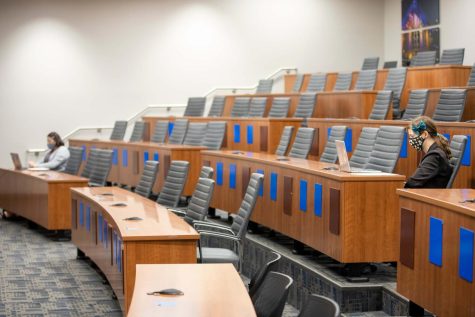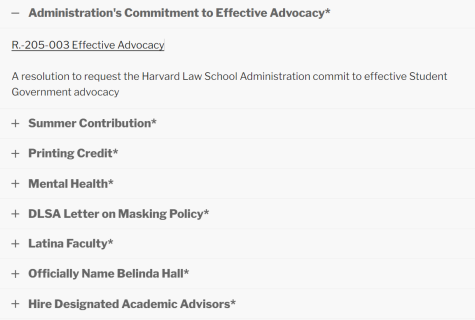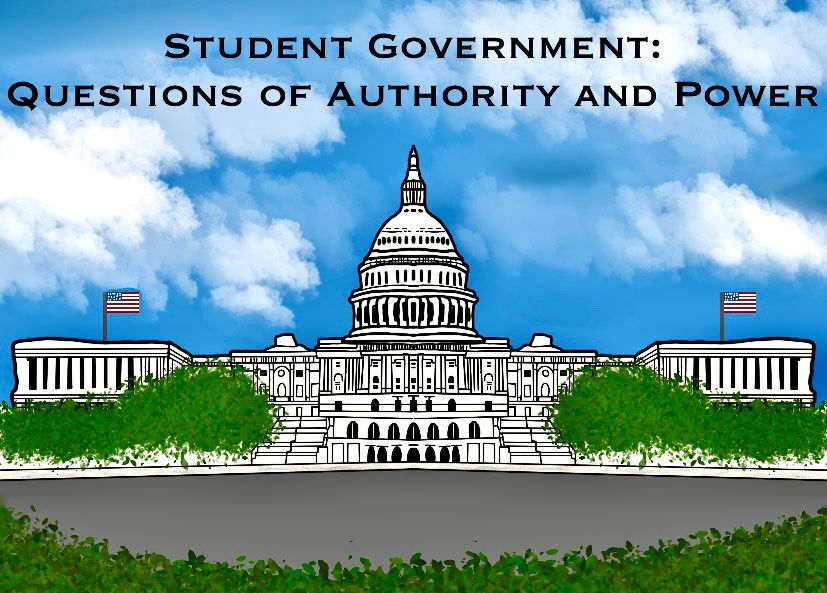Student Government: Questions of Authority and Power
March 22, 2023
Many schools have student government associations to organize school events, promote school spirit, and advocate for fellow students. Yet where we draw the line with student government authority has long remained a question of debate. Read and play along with Eastside as we explore potential ways to increase student voice, empower student governments, and more.

Student government associations need more power
Student councils often serve as the liaison between the student body and the school administration. The student council can be a powerful advocate for students, but many councils may lack the power necessary to make meaningful changes. In my opinion, the SGA needs more authority to effectively represent the interests of students.
“The student council doesn’t really have much power at all. They might have some say in planning school events, but they don’t have any real authority over school policies or decisions,” said Maria Bravo (‘24).
One reason why student councils may lack power is that they do not have the same status as school administrators. Administrators have the power to make decisions that impact students’ daily lives, but councils often do not have the same level of authority. In some cases, school administrators may even overlook student council proposals or disregard them entirely.
“The student council is really just a figurehead. Just like the monarchy in England. They might make suggestions, but they don’t have any real power to make changes,” said Koi Baker (‘26), siding with Jane.
Another reason why student councils may not have enough power is the lack of resources and funding. Councils often have to rely on limited resources and funding to execute their projects. As a result, student council projects may not have the same impact or reach as the school administration’s initiatives. This can leave student council members feeling powerless and unable to make significant changes.
Moreover, student councils often have a limited tenure that lasts just one year. By the time councils become acclimated to their roles and develop their ideas, it may be time for a new election cycle, and the projects they started may be left unfinished.
Many students feel that the student council’s power is limited to organizing events and activities, such as dances, spirit weeks, and community service projects. While these activities are important, they don’t address the larger issues that students face on a daily basis.
“I don’t think the student council has any real influence over policies like dress codes or homework loads. These are things that affect students every day, and we should have more of a say in them,” Bianca Vitoc (‘25) told Eastside Online, speaking on the topic of the limited power of student councils.
A potential solution to these problems is to give student councils more power and resources. Administrators could better empower student councils by granting them an official voice in decision-making processes. This could be achieved by granting councils voting rights on school committees or boards. Additionally, councils could be provided with a budget to execute their projects and ideas.
In conclusion, student councils are an essential institution in schools. They have the potential to make significant changes in the school environment and help represent the interests of students. However, many student councils lack the power necessary to carry out their vision effectively. By granting student councils more power and resources, they can become more effective and have a more significant impact on the student body.
As Baker said, “We need to work together to create a school where everyone feels heard and valued.”
Resolutions: The editorial voice SGA should utilize
Generally used to proclaim support or disagreement with administrative policies and decisions, resolutions can offer a powerful tool to student government associations. They afford student bodies with a stronger voice, improve student-opinion transparency, and can help foster a stronger sense of school community. Resolutions allow a student government association to better express a position on a particular issue or topic on behalf of the study body it represents.
Perhaps more importantly, though, the use of resolutions by the Cherry Hill High School East Student Government Association (SGA) could offer a potential solution to community criticism about a lack of student voice. If the East SGA more actively wrote and passed resolutions, for example, students may feel that their voice was more actively heard and expressed.

“There’s very little [SGA] can do,… which is why some kids have issues with the school,” Aaron Mirowitz (‘26) told Eastside Online. “I feel like [SGA] should have the power to do the change I want in the school,” he added, later also expressing support for the SGA to use resolutions more frequently.
Resolutions would undoubtedly grant East SGA additional powers to cause the change that Mirowitz and others want. Take Harvard Law School’s student government association, for example, which passed fourteen resolutions last year, condemning the Russian War on Ukraine and requesting the installation of more microwaves on campus, among other things. Such resolutions empowered the Harvard student body to better make formal, direct communications to school administrative officials.
Resolutions have another important benefit too: they provide the SGA with editorial power. Eastside, which usually includes editorials in each of its issues, uses editorial power to support or condemn different policies or actions made in the community and even call for various community reforms. In the past, for example, Eastside has encouraged the district to make the PSAT optional for sophomores, supported the uncensored production of Ragtime, and called for better changing options for genderqueer students.
The SGA has authored formal messages directed at school administration in the past. Yet today no SGA system for passing or creating actual resolutions exists. If the SGA created a process to pass resolutions, though, the student body would be able to better respond to issues and crises within our community — and in a timely manner too.
Presidential Perspective: East Class Student Government Associations need some change
Being the Freshman Class President, I personally think that the class Student Government Associations (SGA) needs to shift focus. It would only make sense that the position of President comes with a certain amount of say in our school on policies and ability to advocate for student voice. However, this is not the case.

Although the title seems like it comes with power, the President primarily focuses on creating class dances and events and orchestrating fundraisers to raise money for them. And while the SGA should mainly focus on planning such activities, I feel some authority should be given to represent the voice of the students. With the title of President comes the assumed responsibility of advocating student voice. Yet it does not come with any authority to carry out the wishes of the students of the class.
With this in mind, I do not believe that each Class Student Government needs radical reform. I just ask for our responsibilities to be expanded. Perhaps we could occasionally meet with our grade level administrator, aid Schoolwide SGA in some of their policies, or have a say in board decisions. I believe I am speaking for most of the Student Government when I say that we assume our elected positions thinking we will be able to make our school a better place for everyone. Thus, for the betterment of our whole school community, I think we can all agree that Class Student Governments could use additional authority.
Many schools have student government associations to organize school events, promote school spirit, and advocate for fellow students. Yet where we draw the line with student government authority has long remained a question of debate. Read and play along with Eastside as we explore potential ways to increase student voice, empower student governments, and more.
Student governments differ in college and high school
In recent times, the concept of a ‘student government’ at American public schools has become predominant. Many schools now possess student leadership bodies which serve as advocates of student interest and voice, as well as form a link between student bodies and school administrations. In some school districts — Cherry Hill among them — student governments may be found at both the middle school and high school level. In addition, student governments have become a major part of higher education, common in American colleges and universities. For students leaving Cherry Hill High School East behind and entering higher education, the differences in the role of student government may surprise them.
To begin, many universities possess multiple student governments, often dealing with separate colleges within them. At the University of Pennsylvania, for example, separate student government bodies exist for the Perelman School of Medicine, Carey Law School and the general undergraduate student body. The existence of multiple SGAs within universities is a result, of course, of universities’ multi-faceted student groups and educational fields — something which most high schools, including Cherry Hill East, lack on the structural level.
One of the first words to spring to mind when one considers a government of any sorts is ‘constitution’. Indeed, publicly accessible constitutions and bylaws are common in major college and university student governments. A constitution or mission statement for student governments may be found on nearly all college websites, free and open for anyone, even people non-affiliated with the college, to view. By contrast, this is not often the case with high school student governments across the country. While some possess easily obtainable constitutions or guidelines, others do not. Here in Cherry Hill, the SGA does not possess a constitution readily accessible to all students.
Finally, colleges and universities generally possess student governments with far more capability and resources in contrast to high school representative bodies. For example, the University of Pennsylvania’s student government homepage states that the “Penn Student Government (PSG) reaches many corners of student life, from funding hundreds of student groups, to planning social events, guest speakers, and concerts, to advocating on behalf of students on academics and other issues, and ensuring that all voices—particularly the under- and mis-represented ones—get heard by the administration.” This description includes certain clauses alien to many high school student governments, including the East SGA. Funding for student groups at East is done usually independently of the SGA. And while East’s SGA is most definitely involved in its diligent organizing of social events, concerts and guest speakers are not usually the norm. The majority of this divergence may be explained by the more limited resources and latitude of students and representative bodies in high school as opposed to those of universities.
All in all, graduates from East and other high schools nationwide who are headed to higher education have one more thing to look forward to amidst many novelties in their new lives: their student governments are to be different from those they are leaving behind
SGA should be able To endorse candidates for the BOE
Even though they are not allowed to vote in government elections until the age of 18, the school-wide student government of Cherry Hill High School East should be able to endorse candidates for the Board of Education (BOE).
Each spring, students are able to have their voices heard as they elect a school-wide president and three vice presidents to represent the entire school in the next school year. Each class goes through a similar process around the same time, but the school-wide Student Government Association (SGA) election is even more important.
Those who come out victorious have the support of the school and are granted permission to speak out on behalf of the school and their peers.
Freshmen Madeline Olson and Hannah Hoskins shared with Eastside a controversial opinion regarding whether or not the school-wide SGA should be a voice for our school in this way.
“It doesn’t directly apply to us students within East so why have SGA promote them,” Olson(’26) and Hoskins (’26) agreed.
However, they continued to describe how even though we might not be impacted by the Board of Education, they still make decisions that can impact our high school careers and our community.
“With that being said, [we] would support the idea that [the school-wide SGA board endorse candidates].”
Many students also feel that the SGA should have more of a say in the BOE election process, considering that the BOE makes some of the decisions for our school.
SGA President Chris Shin’s (‘23) words are exactly what the administration should consider when evaluating whether or not the SGA should be able to endorse candidates.
“The strongest voice of the student body is the election itself. I want to preserve and respect that voice for what it is.”
Pending approval from the East administration, Shin and his Vice Presidents should thus be allowed to be a voice for all of the students at East by endorsing candidates in the BOE election process.
